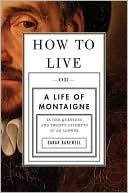More on this book
Community
Kindle Notes & Highlights
there is no escaping our perspective: we can walk only on our own legs, and sit only on our own bum.
“With such frequent and ordinary examples passing before our eyes,” wrote Montaigne of Arnaud, “how can we possibly rid ourselves of the thought of death and of the idea that at every moment it is gripping us by the throat?”
Death is only a few bad moments at the end of life, he wrote in one of his last added notes; it is not worth wasting any anxiety over.
“Don’t worry about death” became his most fundamental, most liberating answer to the question of how to live. It made it possible to do just that: live.
There is no more beautiful life than that of a carefree man; Lack of care is a truly painless evil.
In a dialogue called “On Tranquillity of Mind,” he wrote that idleness and isolation could bring to the fore all the consequences of having lived life in the wrong way, consequences that people usually avoided by keeping busy—that is, by continuing to live life in the wrong way. The symptoms could include dissatisfaction, self-loathing, fear, indecisiveness, lethargy, and melancholy. Giving up work brings out spiritual ills, especially if one then gets the habit of reading too many books—or, worse, laying out the books for show and gloating over the view.
His “reverie” in turn gave Montaigne another mad idea: the thought of writing. He called this a reverie too, but it was one that held out the promise of a solution. Finding his mind so filled with “chimeras and fantastic monsters, one after another, without order or purpose,” he decided to write them down, not directly to overcome them, but to inspect their strangeness at his leisure. So he picked up his pen; the first of the Essays was born.
If you become depressed or bored in your retirement, he advised, just look around you and interest yourself in the variety and sublimity of things.
Salvation lies in paying full attenti...
This highlight has been truncated due to consecutive passage length restrictions.
Learning how to die was learning to let go; learning to live was learning to hang on.
In truth, however hard you try, you can never retrieve an experience in full.
Similarly, to see the world exactly as you did half an hour ago is impossible, just as it is impossible to see it from the point of view of a different person standing next to you.
What was unusual in him was his instinct that the observer is as unreliable as the observed. The two kinds of movement interact like variables in a complex mathematical equation, with the result that one can find no secure point from which to measure anything.
To try to understand the world is like grasping a cloud of gas, or a liquid, using hands that are themselves made of gas or water, so that they dissolve as you close them.
it follows its author’s stream of consciousness without attemptin...
This highlight has been truncated due to consecutive passage length restrictions.
for your imagination can make you believe you are experiencing enhanced pleasure whether you “really” are or not. In the end, the oddity of the human mind is all we can be sure of—an extraordinary conclusion which seems to bear no relation to the topic he was originally aiming at.
“That our happiness must not be judged until after our death,”
perhaps our judgment about whether a man has been happy has more to do with how he dies.
In truth, a person who has had a good life could die very badly, and vice versa.
Montaigne seems set to finish by saying that, in any case, he hopes his own death will go well. But at the very end he remarks that by “going well” he means going “quietly and insensibly”—hardly
most of Montaigne’s thought consists of a series of realizations that life is not as simple as he has just made it out to be.
Life is what happens while you’re making other plans, they said; so philosophy must guide your attention repeatedly back to the place where it belongs—here.
life does not pause to remind you that it is running out. The only one who can keep you mindful of this is you:
The trick is to maintain a kind of naive amazement at each instant of experience—but, as Montaigne learned, one of the best techniques for doing this is to write about everything.
an ability to just be.


